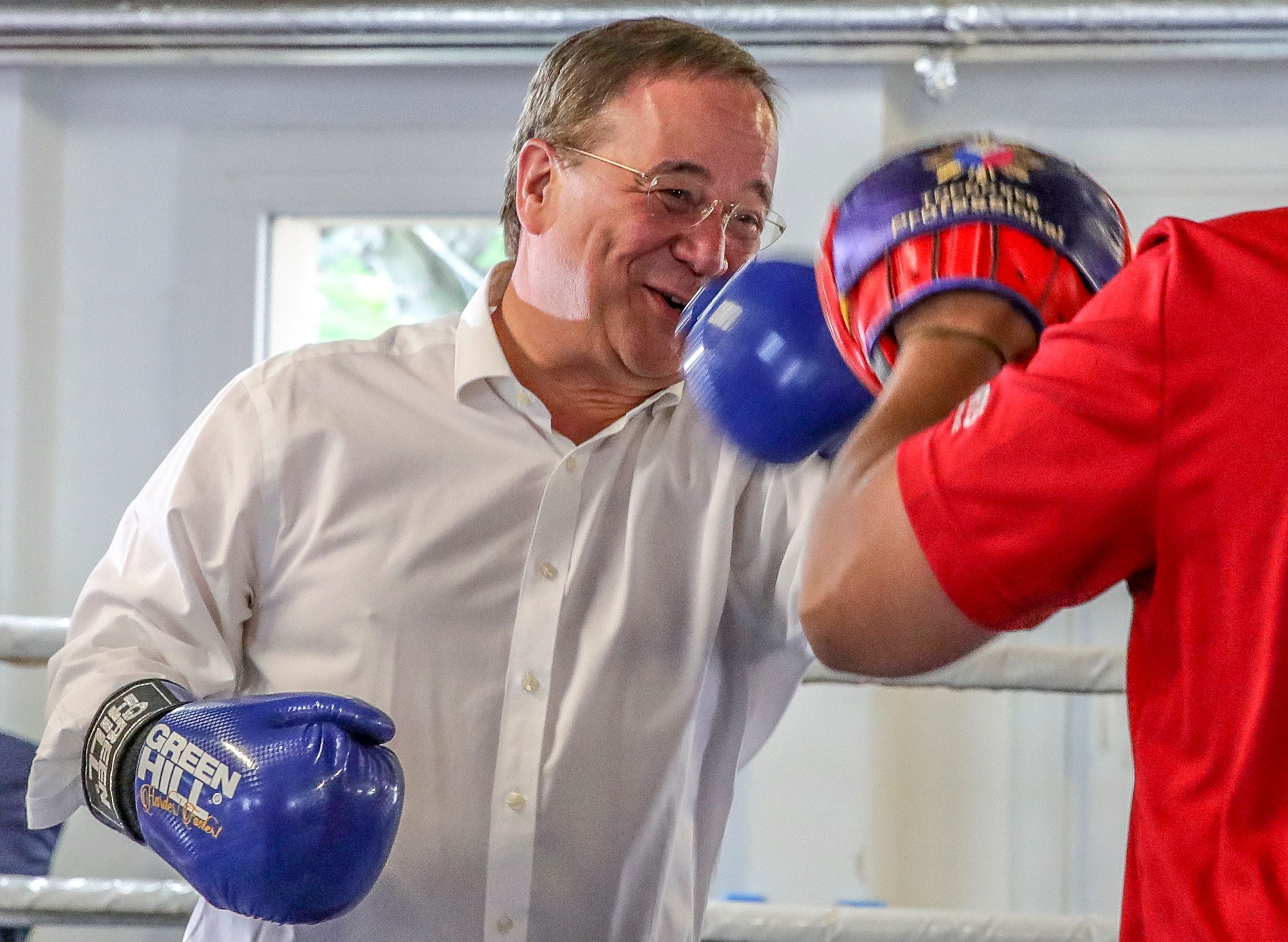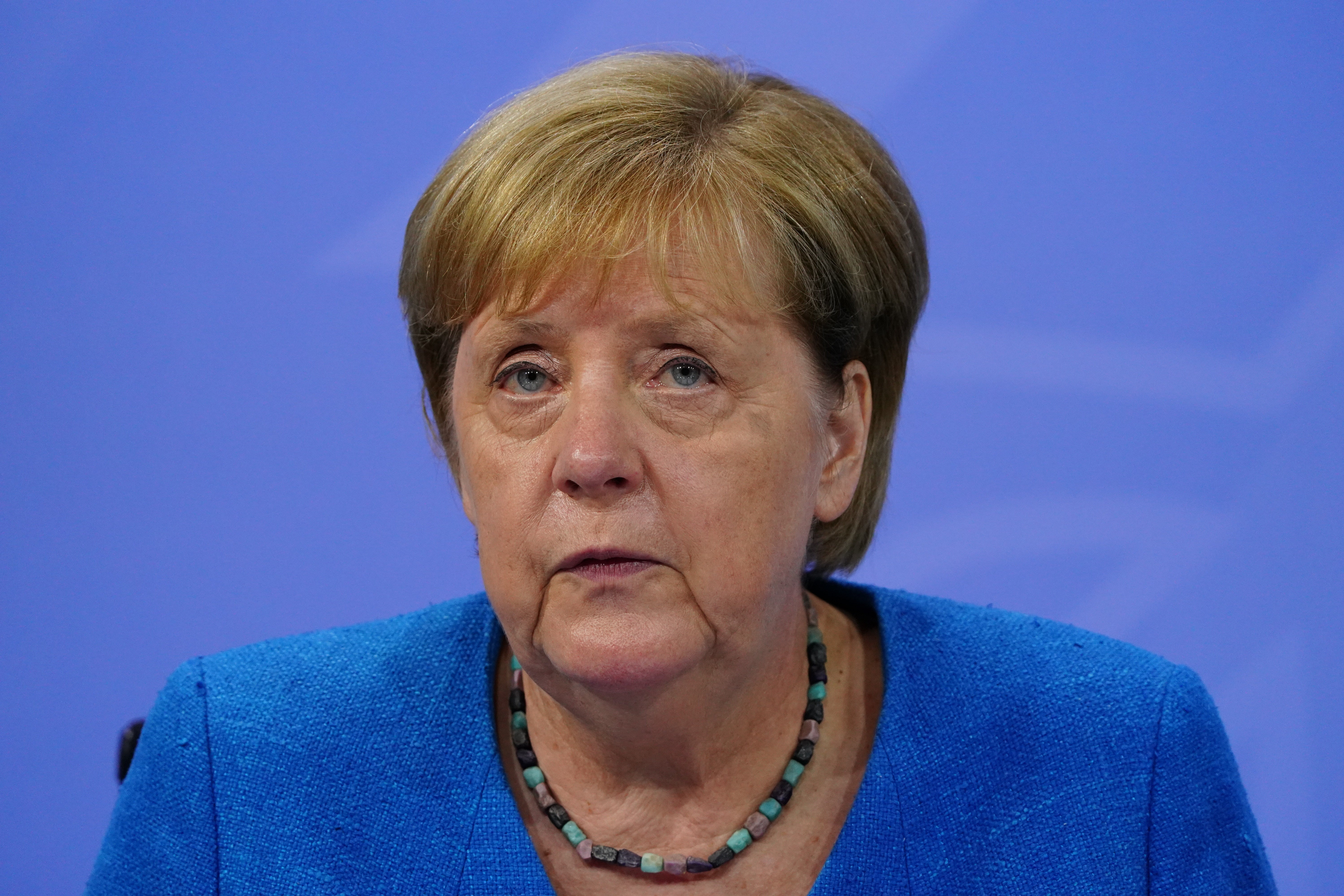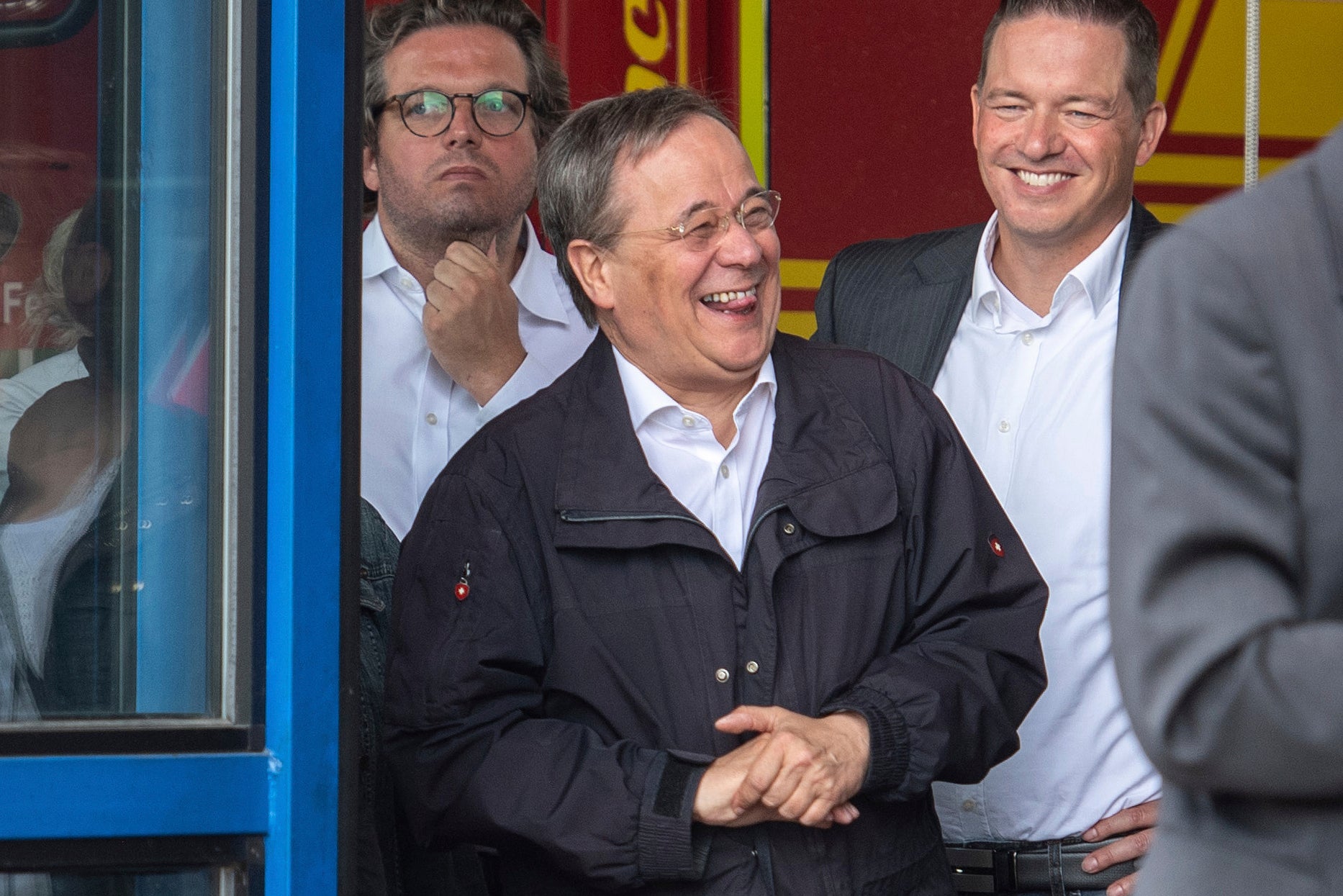Germany’s CDU leader takes fightback to the boxing ring in bid to win over a disenchanted public
The race appears to be wide open in September’s German elections, with numerous possible outcomes, as the Christian Democrat candidate founders

With his once-promising campaign coming apart at the seams amid a steep slide in opinion polls just six weeks before Germany’s election, conservative party leader Armin Laschet put on a pair of boxing gloves and climbed into a ring the other day to try to show his fighting spirit at the start of the race’s hot phase.
But the soft and tentative jabs that Laschet cautiously threw at his taller sparring partner in Frankfurt on Wednesday did nothing to dispel the candidate’s lingering image as a lightweight. Wearing leather dress shoes, business trousers and a pressed white shirt in the ring after removing his suit jacket, Laschet looked as flat-footed and out of place inside the ropes as he has been on the outside.
“Boxers know how to take a punch,” Laschet later told reporters covering the inauspicious start of his campaign in Frankfurt at a youth boxing club in a depressed section of town. “They know how to take a punch and yet still concentrate on the fight. That’s what’s in store for us for the next six weeks.”
Laschet has never been one to light up the room when he comes into it. And he may be doing a decent job as state premier. But there’s no excitement. No electricity. He’s making too many mistakes
Laschet’s gaffes, stumbles and awkwardly limp moments such as those in the boxing ring have turned what once appeared to be a near-certain victory for his conservative Christian Democrats (CDU) on 26 September into a wide-open race with a wide variety of possible coalition outcomes. The ill-timed slump could end up costing Angela Merkel’s party the chancellery, sending the country’s dominant post-war party into opposition for the first time in 16 years.
Merkel, 67, is retiring in September and will be the first post-war German leader to leave office voluntarily. She has not yet helped Laschet on the campaign trail – who sometimes made life difficult for her with occasional opposition to her leadership during the the Covid-19 epidemic – and until Thursday it was uncertain whether she would after her preferred successor, the defence minister, Annegret Kramp-Karrenbauer, was forced to resign as party chair last year and abandoned a hapless bid. But late on Thursday the CDU announced that she would attend a rally in Berlin with Laschet on 21 August.

A leading opinion poll by the Forsa Institute for RTL Television this week showed the CDU had fallen by a staggering seven percentage points in the past four weeks to 23 per cent while the Green party was in second place, up one point to 20 per cent. The centre-left Social Democrats were third and up four points to 19 per cent. Together with the pro-business Free Democrats, a possible coalition partner in fourth at 12 per cent, the three latter parties could form a so-called “Green-Red-Yellow” government based on their respective party colours, without the conservatives, if the elections were held now.
“Laschet has really messed things up for the conservatives with his blunders,” said Thomas Jaeger, a political scientist at Cologne University, in an interview with The Independent. “He had a chance to show he’s a strong leader but instead he’s showed everyone that he’s out of his depth. Laschet has never been one to light up the room when he comes into it. And he may be doing a decent job as state premier. But there’s no excitement. No electricity. He’s making too many mistakes.”
The main reason for the CDU’s tailspin, pollsters said, is that voter confidence in Laschet has plummeted as a result of two serious campaign errors in the past month: first he was seen on television smiling and laughing as he stood behind President Frank-Walter Steinmeier, who was delivering solemn remarks to victims of devastating floods in western Germany last month; secondly, the premier of North Rhine-Westphalia, Germany’s most populous state in the far northwest of the country, was forced to concede recently that he plagiarised passages from other writers for a book published under his name in 2009.

“It was stupid and shouldn’t have happened and I regret it,” Laschet said on 25 July of his giggling at the flood site in a German TV interview. He had prevaricated about the apology for several days, first insisting he was not able hear what Mr Steinmeier was saying, because he was standing so far behind him, and that he was only laughing at a joke someone whispered in his year – not at the president for his speech to flood victims. The images were nevertheless devastating for Laschet. “I am sorry. I can’t say much more than that.”
In the Forsa poll, only 12 per cent of the voters said they had confidence in Laschet as the next chancellor. That was down from 24 per cent a month ago. Meanwhile, confidence in the SPD candidate, Olaf Scholz, the country’s finance minister, climbed 12 points to 26 per cent. The Green Party’s candidate, Annalena Baerbock, had the confidence of 16 per cent of the voters, up from 13 per cent a month ago. German voters cast their ballots for parties and do not vote directly for chancellor candidates. It is likely that at least three parties, rather than two as is currently the case, will form a majority in the next Bundestag, or German parliament.
A former journalist with little charisma, Laschet, 60, has been the leader of the CDU since last year but has yet to make a mark on the country. Bavaria’s state premier Markus Söder, leader of the CDU’s sister party, the Christian Social Union, is a more obvious conservative flagbearer. More charismatic than Laschet, Söder is far more popular in opinion polls and 40 per cent said they would have confidence in him as chancellor.
The flood could have been his moment to shine as a leader like others such as Gerhard Schröder and Helmut Schmidt. But instead it only made him look like a weak leader
Laschet – whose surname could be translated into “lax”, “lenient” or even “feeble” in English – has left little impression with voters and never stood out or for anything. Thomas Jaeger said that not even conservative voters in Germany could identify two or three ideas that Laschet is campaigning on. Laschet once admitted to Die Zeit that he likes to bet on Bundesliga soccer games every Saturday – but only wagers €5 on each match that he expects to end in a draw. It’s an unusual betting strategy that reflects a cautious attitude, analysts said.
“He hasn’t developed a profile at all and there’s nothing very exciting about him at all,” said Jaeger. “He had horribly bad luck with the floods and in his visits there he cuts a sad figure with his hair soaking wet from the rain and his leather shoes covered in mud. The flood could have been his moment to shine as a leader like others such as [earlier chancellors] Gerhard Schröder and Helmut Schmidt. But instead it only made him look like a weak leader.”






Join our commenting forum
Join thought-provoking conversations, follow other Independent readers and see their replies
Comments